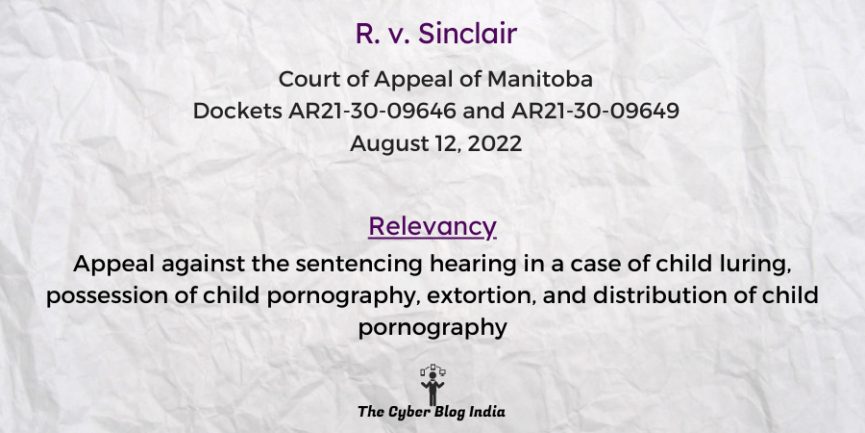R. v. Sinclair

R. v. Sinclair
2022 MBCA 65
In the Court of Appeal of Manitoba
Dockets AR21-30-09646 and AR21-30-09649
Before Justice F.M. Steel, Justice W.J. Burnett, and K.I. Simonsen
Decided on August 12, 2022
Relevancy of the Case: Appeal against the sentencing hearing in a case of child luring, possession of child pornography, extortion, and distribution of child pornography
Statutes and Provisions Involved
- The Criminal Code, 1985 (Section 163.1, 172.1, 356(1), 718.3)
Relevant Facts of the Case
- Beginning in May 2012, the accused lured children over the internet using chat and gaming sites to communicate with female children. He asked them to participate with him on video calls.
- On calls, he would tell the children to disrobe and expose their private parts. He would then capture video and still images of children and save them in a file on his computer.
- He made 112 images and 52 videos of child pornography of four identified and eight unidentified children. The youngest children were 13 years old. He also extorted a 17-year-old victim by threatening to send her images to her family and friends.
- He pleaded guilty to the offences of luring a child into making child pornography.
Prominent Arguments by the Counsels
- The accused’s counsel argued that the sentencing judge focused on incorrect aggravating factors. He had a significantly lower level of moral culpability and contended a two-year custodial period would be proportionate. The counsel further argued that the age of victims was an essential element. He also submitted that the finding of Nazi material in his possession had nothing to do with the offences he was being sentenced for.
- The prosecution’s counsel submitted that the sentencing judge fulfilled statutory obligations by considering the victim’s age as an aggravating factor. The accused was aware of the victim’s young age during sexual abuse.
Opinion of the Bench
- Aggravating factors may extend beyond an offence’s basic elements. The court recognised age’s significance in assessing guilt and the offender’s moral blameworthiness.
- The sentencing judge’s mention of the accused’s Nazi beliefs had a minor role, and it did not significantly affect the sentence.
- Using an individual’s criminal record to increase their sentence would punish them twice. However, the court can utilise this to evaluate their future conduct and determine the potential for rehabilitation.
- The accused committed multiple and distinct acts that impacted numerous victims over an extended period, resulting in individualised harm to each victim. As a result, it is appropriate to impose consecutive sentences.
Final Decision
- The court granted the appeal by substituting Section 172.1(1)(a) for Section 172.1(1)(b), dismissing the accused’s appeal. Further, the court accepted the prosecution’s appeal to enhance the sentence to eight years from five years.
Adyasha Sahoo, an undergraduate student at the Institute of Law, Nirma University Ahmedabad, and Yagyanseni Acharya, an undergraduate student at VIT School of Law, Chennai, prepared this case summary during their internship with The Cyber Blog India in January/February 2024.
